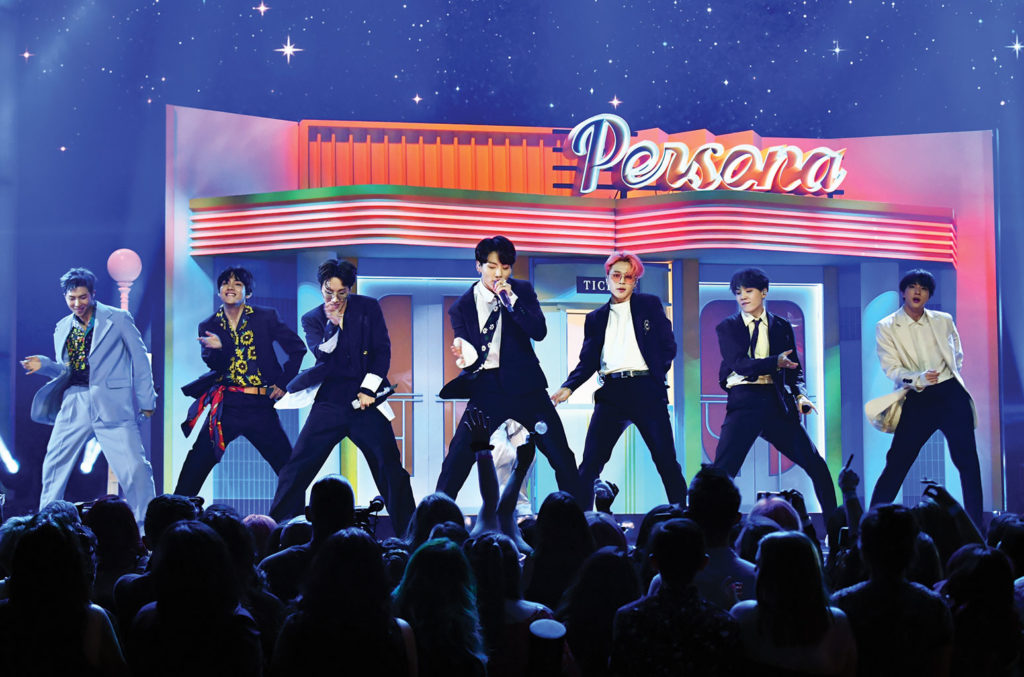Why This Could Be K-Pop’s Big Year For Grammy Recognition – Billboard


K-pop artists took the U.S. by storm in 2020. Will an increasingly global Grammys recognize them — and their telecast-ready star power?
Over the past three years, the Grammys’ general categories have become more international in scope: Bilingual songs like “Despacito” by Luis Fonsi, Daddy Yankee and Justin Bieber and “I Like It” by Cardi B, Bad Bunny and J Balvin scored nods for record of the year, while Rosalía became the first best new artist nominee for music recorded entirely in Spanish. That heightened emphasis on cultural diversity may help K-pop — a genre that smashed streaming records and spawned high-profile collaborations with American superstars in 2020 — finally receive a landmark nomination, or even a few, at January’s ceremony.
For the most part, the Recording Academy has ignored modern K-pop. Though the BTS album Love Yourself: Tear was up for best recording package at the 2019 ceremony, the bestselling boy band has yet to be nominated for its music. Yet the noise that K-pop groups — led by BTS, but also including acts like Blackpink and SuperM — have made during the past year may be too deafening for the academy to ignore.
“I just don’t see how this year’s not the year,” says Jeremy Lopez, executive vp business development at SM Entertainment USA. In 2019, SM partnered with Capitol Records for the U.S. release of SuperM’s self-titled “mini album.” With that project debuting at No. 1 on the Billboard 200 last October, the K-pop supergroup — which features members of EXO, SHINee, NCT 127 and WayV — has begun conversations with its U.S. partners about the most effective way to mount a best new artist campaign. “We all very much know the honor that comes with even a nomination,” says Dom Rodriguez, director of SM Entertainment USA, “and what it would mean to actually win.”
Korean pop acts have spent the past half-decade making inroads in the U.S. music industry as hyper-passionate online fan bases powered stateside arena tours, Coachella performances and, finally, awards-show appearances. BTS took the stage at the 2020 Grammys as part of Lil Nas X’s star-studded “Old Town Road” remix performance; before that, the seven-member group performed its single “Boy With Luv” with Halsey at the 2019 Billboard Music Awards and won the inaugural best K-pop video trophy at last year’s MTV Video Music Awards (VMAs).
In the days leading up to the Aug. 31 eligibility deadline for the 2021 Grammys, BTS released a new single, “Dynamite,” that became its first No. 1 on the Billboard Hot 100. A week later, Blackpink teamed up with Selena Gomez on “Ice Cream,” which just became the girl group’s first top 20 hit, surpassing the No. 33 peak of its Lady Gaga collaboration, “Sour Candy.” Both acts are frequent presences in the upper tier of Billboard’s Social 50 chart, and BTS recently set the record for most YouTube views in 24 hours after the “Dynamite” video garnered 101.1 million plays upon release.
“If you look at the stats that BTS and Blackpink put up, they are global superstars,” says Jeremy Erlich, co-head of music at Spotify. “If I were putting on an awards show, I would definitely want to tap into that audience.”
Indeed, recognizing K-pop would make sense for an awards ceremony not only seeking a ratings boost — the 2020 telecast was the lowest-rated in Grammys history — but a younger, more diverse viewership, which has been a stated priority for the Recording Academy over the past two years. Considering the uncertainty surrounding the 2021 live ceremony due to the coronavirus pandemic, choreography-heavy remote performances from groups based in South Korea could attract precisely the kind of audience the academy needs. After all, the YouTube clip of BTS performing “Dynamite” from South Korea for the 2020 VMAs garnered the most views of any other performance on the Aug. 30 telecast.
“The performance by BTS last year was one of the highlights of the Grammys,” says Steve Greenberg, president of S-Curve Records and a longtime Grammy voter. “It was a moment that got the Staples Center audience excited. And I have to imagine that, even without a live audience, having one of those artists would energize the online community, and [viewership] for the Grammys outside the U.S. would go up dramatically.”
The most likely K-pop nominations would come in the Big Four general categories, since they have been expanded to eight nominees. Blackpink and SuperM are both eligible for best new artist, while it’s possible that BTS’ “Dynamite” could be nominated for record of the year. MONSTA X and NCT 127, which each scored top 10 album debuts on the Billboard 200 this year, should not be counted out either.
If 2021 doesn’t prove to be K-pop’s breakout Grammys year, Rodriguez says such recognition is imminent. “There’s too much happening, there’s too much momentum,” he says. “Whether or not there is a nomination this year, I don’t see how you avoid it.”
This article originally appeared in the Sept. 19, 2020 issue of Billboard.